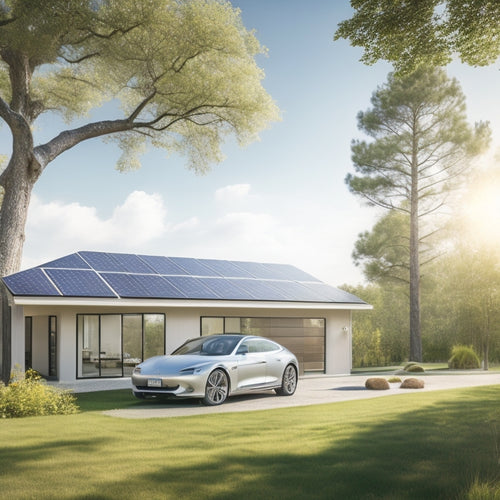
Solar Power Your Hybrid Vehicle: 3 Key Tips
Share
You're considering solar power for your hybrid vehicle, a great step towards reducing emissions and increasing fuel efficiency. First, assess your energy needs by conducting an energy audit and load calculation to determine your vehicle's specific requirements. Next, choose the right solar panels, prioritizing high-efficiency options that match your vehicle's design. Finally, guarantee proper installation and maintenance, including monitoring battery state and keeping panels clean. By following these key tips, you'll be on your way to harnessing the power of the sun. Now, find out how to optimize your system for maximum performance.
Key Takeaways
• Assess your energy needs by considering daily mileage, terrain, and auxiliary power usage to determine the right solar panel system for your hybrid vehicle.
• Choose high-efficiency solar panels (>20%) that match your vehicle's design and offer both style and performance.
• Ensure proper installation with proper wiring considerations and invest in a high-quality inverter for smooth DC to AC power conversion.
• Regularly monitor battery state of charge, voltage, and temperature, and keep panels clean for maximum energy absorption.
• Perform an energy audit and load calculation to guide panel selection and plan for a solar panel system that meets your vehicle's energy requirements.
Assessing Your Energy Needs
To determine the feasibility of integrating solar power into your hybrid vehicle, you must first calculate your vehicle's energy requirements, taking into account factors such as daily mileage, terrain, and auxiliary power usage. This is where an energy audit comes in – a thorough examination of your vehicle's energy consumption habits.
By conducting a load calculation, you'll get a clear picture of your vehicle's energy needs, which will help you determine the size and type of solar panel system required.
Think of it like planning a road trip: you need to know your fuel efficiency, route, and cargo load to estimate your gas stops. It's similar with solar power – you need to assess your energy requirements to determine the right solar panel setup.
Be prepared to get granular, as you'll need to examine details like your vehicle's electrical accessories, battery capacity, and charging habits. Don't worry, it's not as complicated as it sounds!
With a solid energy audit and load calculation, you'll be well on your way to harnessing the power of the sun to fuel your hybrid vehicle.
Choosing the Right Panels
With your energy audit and load calculation in hand, you're now ready to select the right solar panels to meet your hybrid vehicle's unique energy requirements. This is where the fun begins – getting to choose the perfect panels that'll turn sunlight into juice for your ride.
When browsing for panels, keep an eye on Panel Efficiency, as it greatly impacts your energy output. Look for high-efficiency panels (>20%) to maximize your energy harvest. Don't worry, we won't make you do the math, but trust us, it's worth it.
Aesthetics Matters, too! You'll be staring at these panels for a while, so pick ones that blend in with your vehicle's sleek design. Black frames, silver frames, or even frameless options – the choice is yours. Just remember, a sleek design doesn't have to compromise on performance. You can have both style and substance with the right panels.
Installation and Maintenance
You'll need to carefully plan and execute the installation of your solar panels to guarantee a safe and efficient energy harvest. It's not rocket science, but it does require some technical know-how.
Start by making sure your wiring considerations are on point. Proper wiring is essential to avoid electrical shocks, fires, or damage to your hybrid vehicle's electrical system. Keep in mind that your solar panels will be generating DC power, which needs to be converted to AC power for your vehicle's battery. Invest in a high-quality inverter to make this conversion smooth and efficient.
Once installed, regular maintenance is key to peak performance. Battery upkeep is vital to extend the lifespan of your hybrid vehicle's battery. Monitor your battery's state of charge, voltage, and temperature to identify any potential issues early on.
Clean your solar panels regularly to ensure maximum energy absorption. A clean panel is a happy panel!
Frequently Asked Questions
Can I Charge My Vehicle Using a Generator?
You can charge your vehicle using a generator, but you'll need a portable inverter to convert AC power to DC. Make sure you size the generator correctly to avoid overheating and efficiency losses.
How Long Does a Solar Panel System Last?
You'll be delighted to know that a well-maintained solar panel system can last up to 30 years or more, thanks to its durability and your commitment to regular panel maintenance, ensuring peak energy harvesting.
Do Solar Panels Work on Cloudy Days?
You're wondering if solar panels work on cloudy days? Yes, they do, but with reduced Cloudy Efficiency. Proper Panel Orientation helps, but don't expect miracles – think 10-20% of typical output, not enough to power your daily latte habit.
Can I Expand My Solar Panel System Later?
You're wondering if you can expand your solar panel system later, and the answer is yes! You can upgrade your system or add new panels as needed, making it a flexible and future-proof investment.
Will Solar Panels Affect My Vehicle's Warranty?
You're wondering if solar panels will void your hybrid vehicle's warranty. Don't worry, most manufacturers won't void your warranty due to solar panel installation, as long as it's done correctly, and they'll even provide guidance to alleviate those warranty concerns.
Related Posts
-

Essential Accessories for Heavy Riders of E-Bikes
As a heavy rider of an e-bike, you need specialized gear that caters to your unique needs. Start with safety essentia...
-

Why Invest in Solar Car Battery Chargers Online?
By investing in a solar car battery charger online, you're not only reducing your reliance on fossil fuels but also o...
-

Top Online Stores for Solar Car Accessories
When searching online for solar car accessories, you'll find top retailers like Amazon, REI Co-op, and Best Buy offer...


